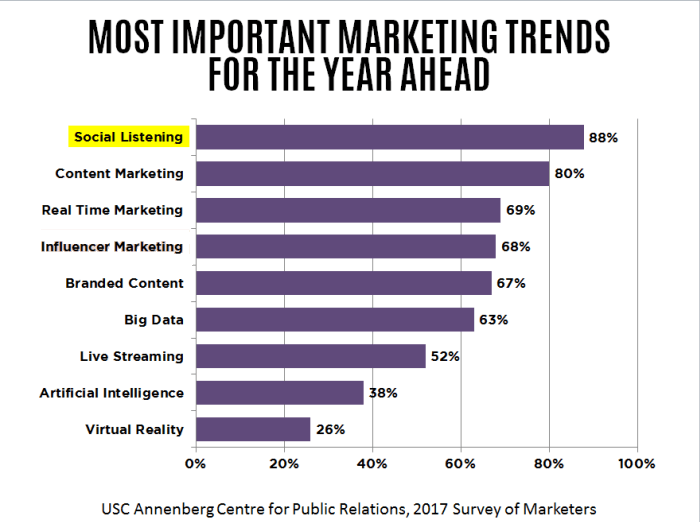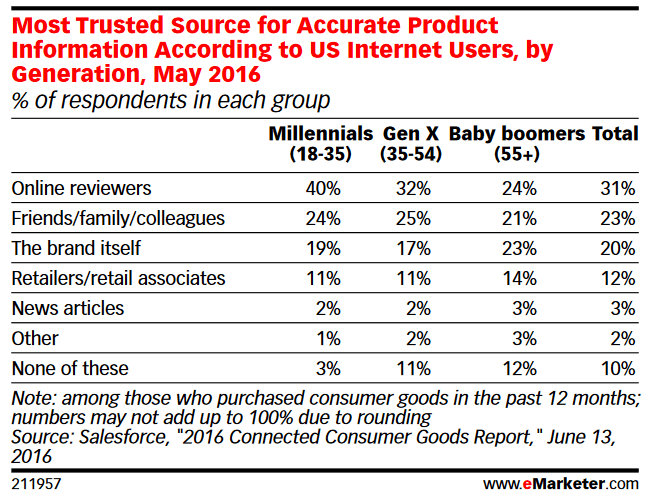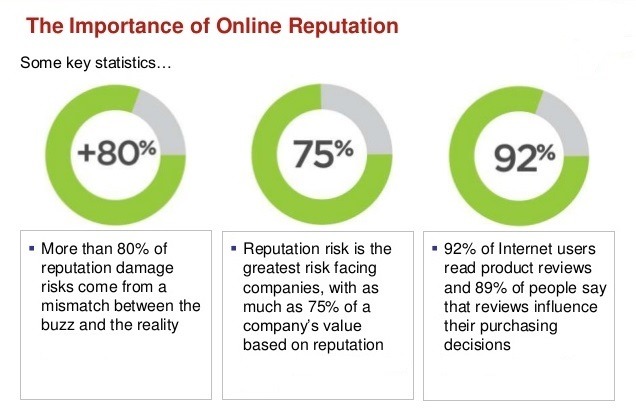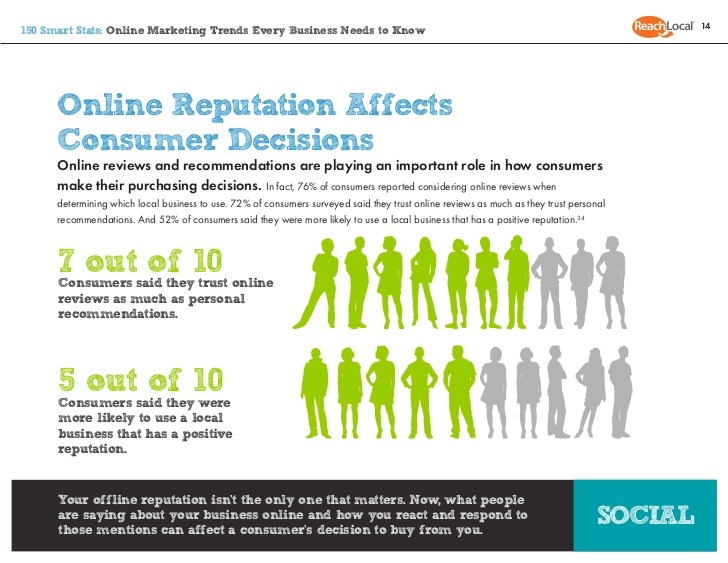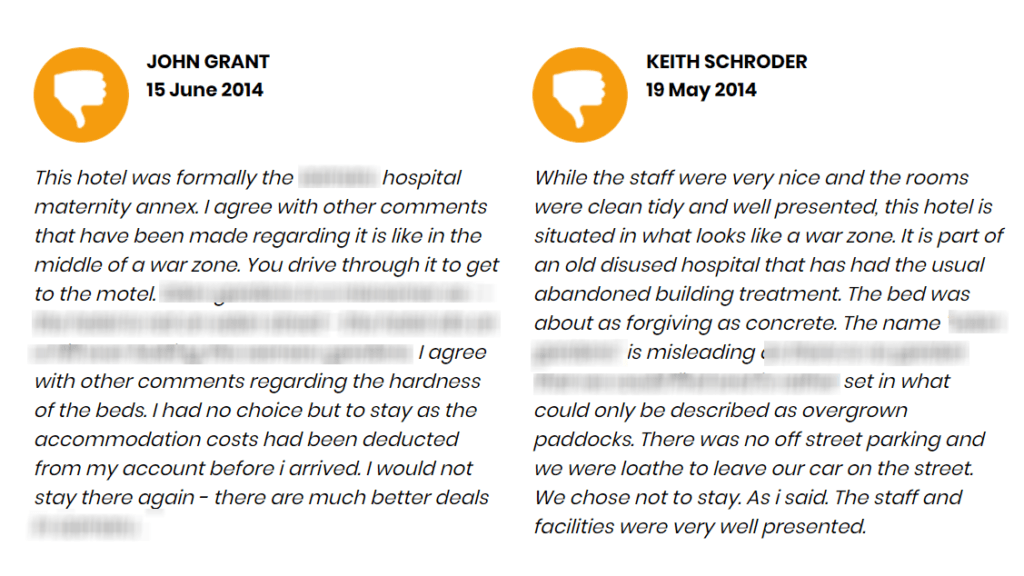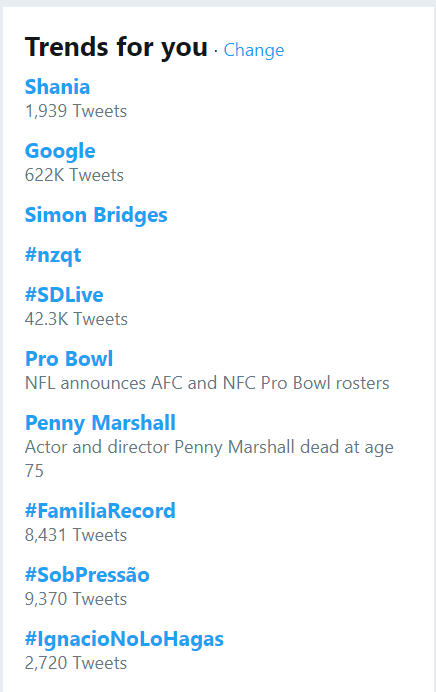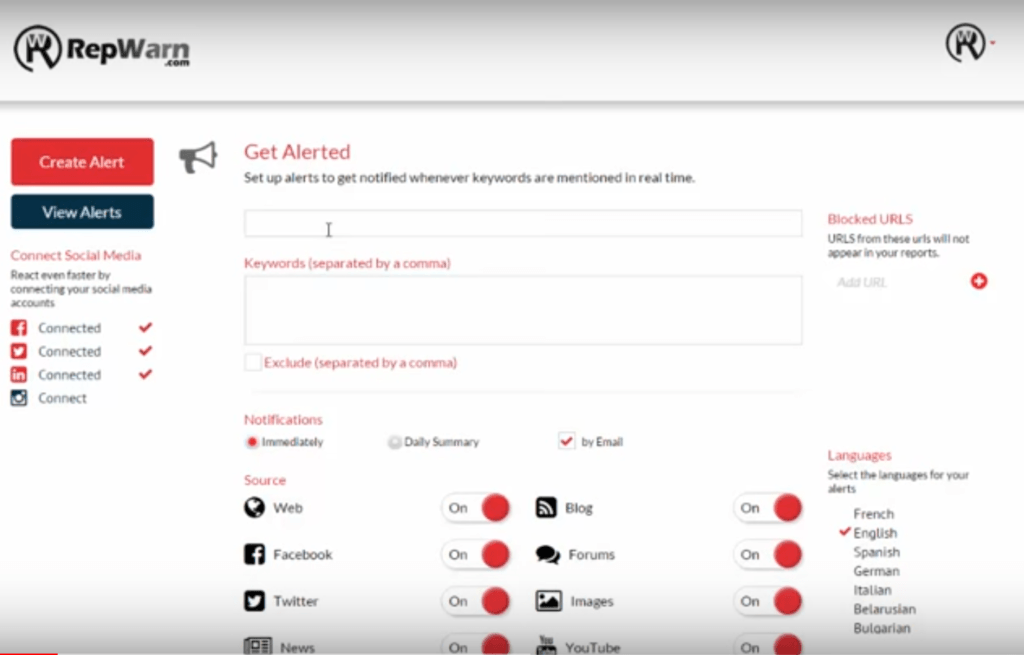People have always talked to their friends and colleagues, to share their opinions (positive or negative) and to seek or give advice before significant decisions. It used to be face to face, but now the talking is far more likely to take place online.
Which is one of the reasons why, in a recent survey of marketers, Social Listening was cited as the single most important trend of the year ahead.
So are YOU listening to what people are saying online?
Why should you? Because, alas, consumers (especially Millennials and Generation X) are far more likely to turn to friends, family, colleagues and even online reviewers for their purchase recommendations. Sorry, marketers, but we did it to ourselves with endless hype, puffery and interruption marketing over far too many years.
In case you’re not yet convinced, here are some more stats to confirm the importance of what’s being said about you online:
And yes, those opinions are shaping the decisions that consumers are making:
Here are 7 reasons why Social Listening is essential.
1 They May Already Be Talking About You, But You Don’t Know It
Fullers Ferries was criticised on Facebook by an unhappy patron (who also happens to be an Auckland city councillor):
The post garnered 44 reactions, 25 comments and 1 share. Unfortunately, none of those responses appear to be from anyone working for Fullers — and the tone of the comments is uniformly negative.
The discussion might have been more moderate if a company spokesperson had stepped in and responded to the issues raised. Unfortunately, the opportunity was lost.
2 They Are Talking About You, And You DO Know It
Sometimes, as in the example below, the complaints are directly addressed to the offending company.
If you’re addressed directly in social media (or if your social media monitoring is real-time and picks up a complaint or question), then you need to respond fast — ideally within an hour.
As David Alston of social monitoring software operators Radian6 notes:
Catching something early means getting a chance to show how responsive you are. A complaint is an opportunity to demonstrate problem-solving abilities. A posted complaint may also draw out other comments from people with the same concern, which provides an opportunity to reach out to them as well. And who knows, impressing customer with great customer service may generate some positive posts about how you resolved the problems.
Here’s another unfortunate example, of negative customer feedback posted to one of the travel booking sites:
This feedback has been visible on the site for four years (we’ve anonymised the comments to protect the unfortunate provider). You can bet that this negative feedback has killed a great many potential sales over the four-year period.
3 You Can Listen for Expressed Needs
Sometimes, consumers will be talking about products or services that they need. If you’ve set up your monitoring keywords and terms correctly, you may be able to get in ahead of your competitors.
The best way to watch for expressed needs is to look for keywords often used to describe those needs. People shout out what they are doing and ask the general public for advice occasionally when they are about to make a purchase. Both of these situations provide an opportunity to reach out with an offer of assistance or a free demo for example. While this may seem intrusive at first glance consider that great retail clerk who offers to help when you are trying to locate a pair of shoes in your size. A social media poster often appreciates that someone is listening and does not mind an offer of assistance especially if it’s done in a helpful way.
4 You Can Keep Tabs on What’s Trending
Topics will often pop up online that draw huge crowds from a page visits or commenting perspective. There is a lot to be learned in discussion threads especially when they have the potential to affect your brand. Following the swarms can give you a better understanding of current sentiment and thinking towards a certain topic and who the players are that have opinions on it. It also may point out a topic that you will need to monitor going forward. Tracking a topic’s viral nature and how long it lives can give you an idea of its relative importance. You may also decide to participate in the crowd discussion thread early in the process, giving your company exposure to those currently involved in the discussion and to those yet to join.
You can see what’s trending near you on Twitter, just by visiting the front page of Twitter.com.
5 You Can Identify and Monitor Influencers
Influencers within a space can carry a lot of weight. They gain their power either from the number of times they post on a topic, the number of people who link to their posts on a topic, the number of people gathering to comment and how engaged visitors to their posts become. The hive that forms around an influencer helps spread an opinion on a brand faster and that opinion express potentially carries more weight. Often an influencer’s post appears prominently in a topic’s Google search results thus affecting the views of even more potential customers. Knowing who these influencers are and their opinions of your brands helps you determine who to reach out to for help as advocates or to understand why they currently hold a negative view.
Shannon (Shaaanxo) is a Kiwi influencer with million-plus followings on YouTube and Instagram
6 Get Early Warning of Potential Crises
Discussions happening in social media can serve as an early warning system before an issue goes mainstream. By using advanced tools you can observe new words popping more frequently about your brands. If you were an airline, as an example, the sudden appearance of the word “cancellations” along with the words “bad” and “customer service” would immediately trigger a need to drill into the posts driving them. Tracking these “crisis” words over time on a go forward basis would also then help gauge the effectiveness of any outreach campaigns to address the underlying issues.
When prospective customers react this negatively, it’s time to reconsider your policy
7 Collect Social Proof
Sometimes, people actually say nice things in social media.
Compliments can come in many forms. It could be a congratulations message about a recent award. It could be a customer raving about the experience they just had with a product or with customer service. Social media compliments are the online equivalent of those old school references or testimonials of days past. Save all of these compliments in a list for future use. Potential clients looking for reassurance on a purchase decision would love to see what others think of your company and products.
What to Do When Things Go Bad
Even when you get into Reputation Management proactively, it won’t always go smoothly. Marty Weintraub, President of aimClear Search Marketing Agency, captured the moment in a presentation entitled “The Dark Side of Reputation Management”:
- Expect to make mistakes. First, any active social marketer can expect to make mistakes which cost sleep, cause worry, and alienate others—it’s the reality of the game. Subscribe to the theory that “nothing ventured is nothing gained” and forgive yourself in advance for inevitable screw-ups. Social media is just that: social. Humans tend to be unpredictable, especially in groups. Anyone who dives into social media without accepting that the results will be a mixed-bag-learning-curve risks being prematurely discouraged at inevitable rejection. Hell, several record companies said “no” to Elvis. Not everyone is going to love you.
- Do not lose your cool (or, stupid is as stupid does). This can’t be stressed enough. No matter what the appropriate PR crises response turns out to be, there is seldom equity in hasty emotional comebacks. It rarely works to respond during the heat of anger, so get a grip. When rejected, it’s normal to feel hurt, anger, sadness, and even rage. Count to 350, wait until tomorrow, eat some comfort food, or find another way to chill out..
Not a good idea: It’s true that some disasters require an immediate online response, but these instances are truly rare. There’s nearly always 5 minutes or 2 hours available to wait without impacting the ultimate outcome. Pay attention to emotional red flags and be the most mature party at the table.
It’s true that some disasters require an immediate online response, but these instances are truly rare. There’s nearly always 5 minutes or 2 hours available to wait without impacting the ultimate outcome. Pay attention to emotional red flags and be the most mature party at the table. - Fight fire with water, not fire. When some social media twit unfairly flames your company (or you personally), it’s tempting to nuke them. As professional marketers we usually know the forums to post to, blogs to comment in, and have a good understanding of what it might take to completely trash someone in revenge. As human beings, we’re wired to defend the home turf by any means possible. That said, take a moment to distinguish the degree of response necessary. Fight the heat rising off the back your neck whilst your ears turn red and ask if a “high road” response will suffice in this situation.Often we advise clients to actually thank the flamer for initiating what could become a productive dialogue. There’s very little comeback for the provocateur if his or her rant is met with the response, “Thank you for the insight. We appreciate you raising your concern.” We’ve seen multiple cases where this tactic converts the provocateur to a friend. Online or off, this approach is a timeless technique for dealing with angry customers.
- Don’t anger the natives. Preempt debacles by holistically participating wherever online networking takes you. Many—OK, most—passionate social community members either dislike or downright hate marketers. Their concerns are valid in many cases. Be a responsible social media marketer instead.Reckless or selfish marketers dilute the neighborhood content stream, wrecking it for everybody. This common phenomenon particularly irks long term tagging and bookmarking site users. Be cognizant of the norms. Give exponentially more than you take. Respect the indigenous cultural and join in to preserve what’s best about the community. Give a hoot—don’t content pollute.Never spam.Don’t bash the hornets’ nest (i.e., intentionally provoke). I should take my own advice about this one and will vouch for the fact that troll hunting makes for excellent sport. Don’t do it. One obvious method for avoiding a fight is not to start one. Taking the initiative to preemptively attack someone who hasn’t bothered you is an unfortunate tactic favored by losers.
- Get input from others. It’s uncanny how approachable the “stars” in our business are to unknowns in need. I actually approached Danny Sullivan (a leading US Search Engine & Social Marketing guru), as I had heard him speak on this topic. He was completely unselfish and helpful in bringing the entire affair into perspective. I learned a thing or two about the mutually supportive qualities of our community. I have never met a competent social media expert who was unavailable to a respectful approach seeking insight in a difficult situation. When you’re in over your head, get advice from a master.
- Don’t try to save the world if the injustice does not really matter. Get over it. It’s not your place to solve all the injustices on this green earth. Saving the planet is a time consuming endeavour and should only be partaken in the rarest of circumstances.
- Cast your ego aside. A savvy lawyer gave me incredibly useful advice at my wedding. He said, “When my wife and I disagree, I tell her that she ‘might’ be right.” He pointed out that responding with a non-binding statement ceding to the other’s perspective really gives nothing away at all except respect. Success and peace is what matters, not who’s right.When you are attacked in social media and every fiber in your body wants to throttle someone because they’re so totally wrong, check your ego and take a breath. It doesn’t matter if your side “wins” if the flamers have already burnt your reputation down. It’s rather difficult to unring a bell.
- Pre-plan to deal with crisis & opportunity. Ideally, it’s best to have a contingency plan in place for when things hit the fan. We teach clients to create a designated PR council, of which we’re a member. Depending on the size of your organization, this could be as basic as running the situation by your spouse or as complex as assembling the board of directors. Regardless of what’s appropriate in your situation, think ahead and have your resources lined up and ready to go.Out there on the street, there’s a palpable fear of user-generated media. Most marketers understand that at least some component of their marketing mix may indeed be somehow rooted in social media. A commitment to preemptive and responsive tactics to deal with negativity can be essential to overcoming apprehension.
So how can you listen to what consumers are saying online?
Can we tell you a secret?
We’ve had a developer in the UK working on our very own social listening software. Unfortunately, he’s been taking a lot longer than we planned, so we were considering briefing another developer.
Then we discovered Repwarn (http://repwarn.co.nz). We liked it so much, we signed up to represent Repwarn in NZ.
What Is RepWarn? It’s Social Listening reputation management software.
With Repwarn, you can monitor your Brands, Your Products, Your People and even your competitors. Keep track of unlimited keywords and phrases, 24/7.
Anytime anyone mentions your key words or phrases, even if they are sending an angry tweet about you, or posting a review on yelp, you’ll be alerted.
Facebook. Twitter. TripAdvisor. Yelp. Youtube. Blogs. Forums. Google+ You Name it!
The places where your customers make or break your business. The places where conversations happen, where interaction happens and where people reach out using technology.
You may already know that 80% of people change their buying decision after reading a bad review online. And you may never know the review is there, you may not even know there was a problem… but you’re still losing a lot of customers.
Repwarn monitors for you night and day.
Any Keywords. Any Sector… If anyone mentions your name, your brand, your products or even your competitors – you will know about it instantly. (PLUS Repwarn can generate sales for you by delivering high interest leads, direct to you.)
Take a look at Repwarn Reputation Management software for yourself, at http://repwarn.co.nz

